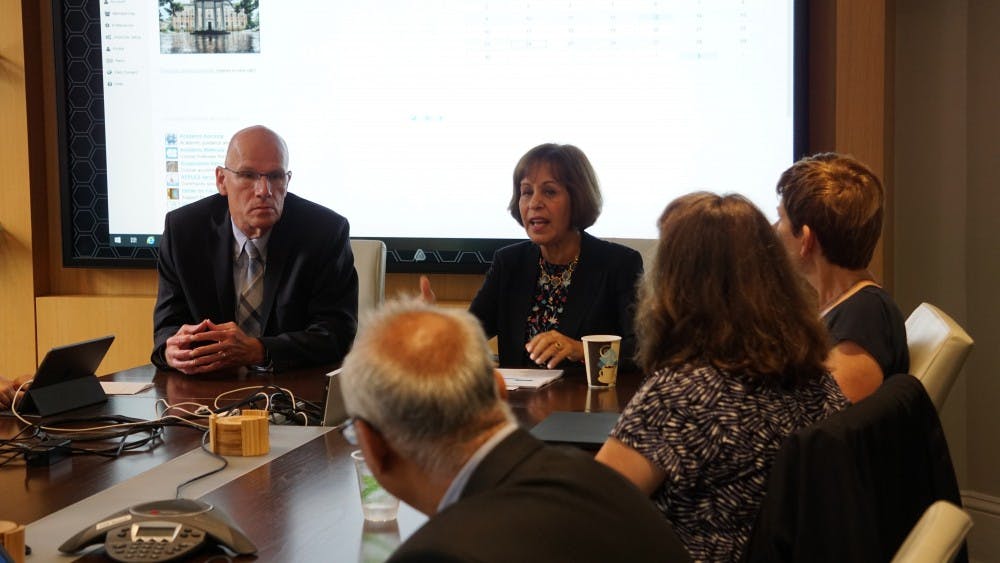“That was a nasty time in history," Scarlett said. "It happened. We can't change it. I do not think we can move forward with the base or statue anywhere on our campus.”
There was overwhelming support for the Black faculty’s denouncement of Silent Sam, which caused a great deal of hesitation regarding the other resolution the council was supposed to ratify that day — formal backing of Folt’s insistence that the statue doesn't belong “at the front door of a safe, welcoming, proudly public research university.”
Problems arose when some professors began to interpret the two statements as being at odds with one another, making simultaneous support of both impossible.
In one corner, the statement from the black faculty is very clear about a zero-tolerance policy regarding Silent Sam’s return. Folt’s statement, however, is ambiguous and nondescript about plans for the statue’s relocation. The “front door” terminology, which alludes to McCorkle Place, was particularly troubling to some council members, who argued that since UNC is an open campus without borders, it wouldn't be feasible for the monument to be displayed in a subtle way that wasn't at the “front door.”
Folt’s refusal to elaborate on her and the Board of Trustee’s thinking processes stiffened the rift between her and the faculty. Folt gave a rendition of the talk she delivered at University Day, saying UNC’s “unique legacy demands we need to reconcile our past with our present and our future.”
The council member who was recognized to ask the second question yielded her time to Lindsay Ayling, a Ph.D. student in the Department of History. Ayling brought along a series of documents she wished to share with Folt.
A self-described Silent Sam protester, Ayling claimed to have been the victim of reoccurring online harassment.
“I printed off some threats,” she said. “These are just a few.”
She went on to describe online interactions: People threatening to run protesters over with their cars, bringing M-16s to a protest and using Stand Your Ground to justify violence, among others.
“This person looked up my history department website and used University-produced information to stalk me, and then said that he would come to my office,” she said. “And he added: ‘Weak-ass c***. I wonder if she’d be so smug if I showed up at her office and said hi.’”
When Ayling finished sharing the threats and asked the Chancellor a question, it encapsulated the ongoing tension between faculty and administration, throwing the room into silence.
“How can you square that with your vow to support law and order?” Ayling asked, referring to Folt’s lack of a confirmation that the statue won’t return to campus.
To get the day's news and headlines in your inbox each morning, sign up for our email newsletters.
“Even if you could square that legally, how do you square that morally?” Ayling asked.
Folt said it wasn't the time or place to give an update about relocation discussions, emphasizing instead the importance for the faculty council to engage in conversations regarding their own opinions.
Eventually, the council decided to combine statements, bolstering the language in the first by adding a clause making clear the council disapproves of the statue’s presence on campus.
The meeting ended with applause for the secretary, who had to guide the council through laborious parliamentary procedure, even when discussions became loud and passionate. As faculty were leaving, the chancellor approached Lindsay Ayling.
She apologized and offered to look at the threats so the University might be able to investigate them. However, the conversation turned hostile when two other people, both around Ayling’s age, joined Ayling’s side and started harshly criticizing Folt. They attacked her character, and said she was playing both sides of the game and has no real care for the opinions of the students. Folt responded, saying the criticizers had no idea who Folt actually was as a person, and she was tired of talking to them.
Throughout the meeting, an air of dissonance was dividing the professors and the administration. As the November deadline concerning Silent Sam's fate draws near, faculty will not need to wait much longer for Folt's decision.
university@dailytarheel.com



